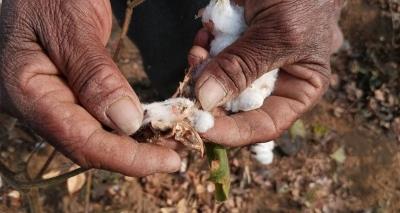
Gujarat Issues Advisory To Safeguard Cotton Crops From Rising Pest Infestations
Officials have recommended the collective use of pheromone traps - two per acre - to track pest activity from sowing until the final picking. Farmers have been advised to replace lures at intervals and record pest counts daily.
The circular further suggests neem oil sprays, neem-based pesticides, and biological solutions such as Trichogramma wasps and Chrysopa eggs to curb pest populations. For pink bollworm management, the advisory details the use of gossyplure RTU tubes at specific intervals during crop growth.
In addition, farmers practicing natural farming have been encouraged to rely on botanical insecticides and mechanical measures such as hand-picking larvae and removing damaged buds. Bird perches have also been recommended to attract insectivorous species that naturally control pests.
The Agriculture Directorate has cautioned against indiscriminate use of chemical pesticides, emphasising that sprays should be undertaken only when economic damage thresholds are crossed, and with proper intervals between biological interventions and chemical applications.
In areas where endemic pest pressure is severe, farmers have been directed to use only university-recommended pesticides in prescribed dosages.
“By adopting integrated methods, farmers can not only protect their crops but also reduce reliance on chemical pesticides, ensuring higher productivity and better incomes,” the advisory stated.
Cotton remains one of Gujarat's most significant cash crops, and experts warn that unchecked pest attacks could dent yields and farmer earnings this season.
Gujarat has around 62 lakh farmers, with nearly 80 per cent being small and marginal cultivators holding less than two hectares of land.
Agriculture remains a vital part of the state's economy, engaging more than 50 per cent of its rural population, though it contributes about 15 per cent to the Gross State Domestic Product (GSDP). Major crops include cotton, groundnut, bajra, wheat, rice, and pulses, while the state is also a leader in horticulture and dairy farming through the Amul cooperative model.
The government supports farmers with schemes such as the Mukhyamantri Kisan Sahay Yojana for crop loss compensation, Soil Health Card schemes, subsidies for drip irrigation and solar pumps, and training programs under Krishi Vigyan Kendras to promote modern farming practices.

Legal Disclaimer:
MENAFN provides the
information “as is” without warranty of any kind. We do not accept
any responsibility or liability for the accuracy, content, images,
videos, licenses, completeness, legality, or reliability of the information
contained in this article. If you have any complaints or copyright
issues related to this article, kindly contact the provider above.


















Comments
No comment